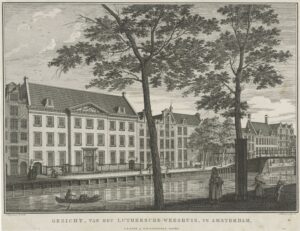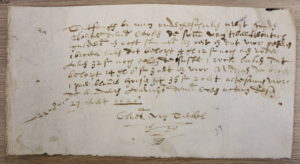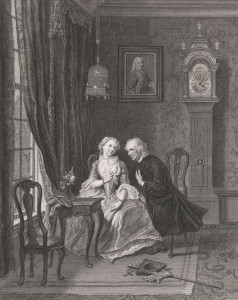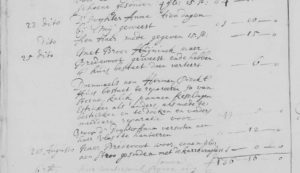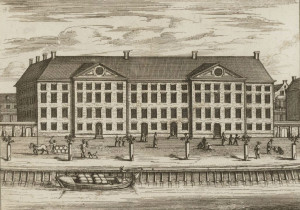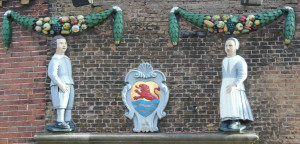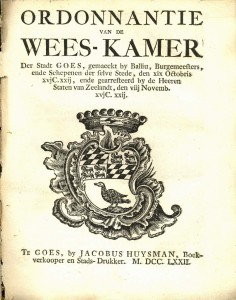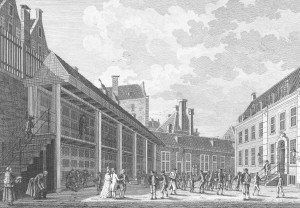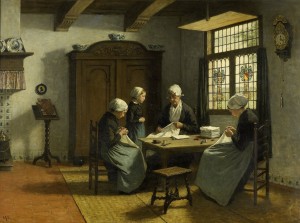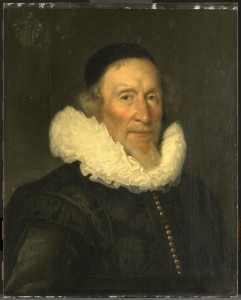A Weeshuis (literally: orphan's house) is an orphanage. Only larger cities had a special orphanage. In smaller cities, orphans were often found families to live with, who would receive a fee for their upkeep. Archives of weeshuizen often include the records of the orphans they took care of. This could tell you when they were admitted, what education they received (often a trade like shoe making for boys and seamstress for girls), and when they were discharged. In the case of abandoned … [Read more...]
Quick tip – Were there children of the first marriage?
If a person wanted to remarry after becoming a widow(er), they first had to come to an arrangement with the children of the prior marriage. These arrangement are often registered in court records, orphan chamber records, or notarial records, often around the time of the publication of the banns of the second marriage. They can provide a wealth of information about family members and the economic circumstances. See the article about the parents of Aleid Laureijs Coolen. A receipt for her … [Read more...]
Quick tip: Did your widowed ancestor make a settlement?
If a widow or widower with young children wanted to marry again, often they first had to make a settlement with their minor children so they received their share of the deceased parent's inheritance. These records can be helpful to prove family relationships, to get insights into the economic circumstances of the family, and to find out about subsequent marriages. These settlements can be found in orphan chamber records, voluntary court records, or notarial records, depending on the time and … [Read more...]
Quick tip – Your ancestors may appear in inventories
Estate inventories and guardians' accounts often contain information about the daily lives of our ancestors. They can tells us what they owned and whom they did business with. If your ancestor was in trade, he may appear in the inventories of some of his clients. This can give you more insight into his business. Depending on the time and place, you can find estate inventories and guardians' accounts in the voluntary court records, in orphan chamber records, or notarial records. Example: … [Read more...]
The Bed-Wetting Colonist
Even after twenty-five years as a genealogist, I am often amazed of the level of detail we can find in archival records. Here is one of the things I ran across when searching for a New Netherland ancestor of a client. In 1652, the colony of New Netherland—which encompassed large parts of what is now the state of New York—was eager for new settlers to arrive. The almoners' orphanage in Amsterdam was approached to send orphans. The almoners' orphanage was the orphanage that took care of the … [Read more...]
Dutch term – Wees
A wees is an orphan. Sometimes you will see the term halfwees [half orphan] or volle wees [full orphan] to refer to a child who lost one or both parents, respectively. While the term wees is nowadays used for a child who lost both parents, in earlier times it could be used for a child who lost one parent. You will see references like "Jan, orphan child of Maria de Wit, assisted by his father Cornelis van Vleuten." Before 1811, some parts of the country had a weeskamer [orphan chamber] that … [Read more...]
Quick tip – Orphans left records too
If children were orphaned, guardians were appointed. Before 1811, some regions had special weeskamers (orphan chambers), in other regions these appointments were handled by the court. After 1811, all guardianship appointments were handled by the court. Read more about using guardianship records to learn about your orphaned ancestors. … [Read more...]
The Sinister Amsterdam Orphan Trade
While doing research at the Amsterdam City Archives, I came across a ledger of orphans working for the Dutch East India Company. The register was part of the records of the Burgerweeshuis, the Citizens' Orphanage. I was fascinated to read how the orphans would learn a trade like carpentry or sail making, and were able to find employment in one of the most prosperous companies of the era. But while browsing the pages, a more sinister picture presented itself. Let's take a look at a … [Read more...]
Dutch term – Voogd
A voogd is a guardian. Before 1811, guardians were usually appointed by the Weeskamer (orphan chamber). After 1811, they were appointed by the court. You can find guardianship appointments in the court records. … [Read more...]
Dutch term – Weesmeester
A weesmeester was a government official charged with overseeing the administration of the estates of orphans. They were usually appointed by the city government. Weesmeesters worked for the Weeskamer. Read the article about Weeskamers for more information. … [Read more...]
